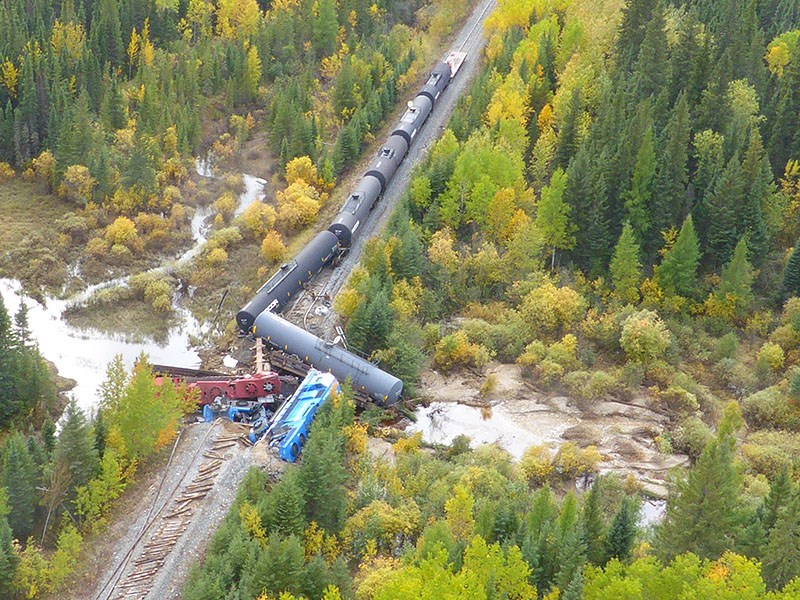An inquest into the derailment of a Hudson Bay Railway train near Ponton four years ago is set to proceed next month after numerous delays, but it will no longer examine whether conductor Kevin Anderson, who died of his injuries, might have survived with earlier medical treatment.
The judge overseeing the inquest said the chief medical examiner who called the inquest had retracted his original opinion that Anderson’s death was preventable and that two medical experts who submitted reports on the circumstances of the conductor’s death didn’t say they believed earlier medical treatment cold have saved Anderson’s life.
An earlier ruling by the original inquest judge in 2021 said the inquest wouldn’t look at all the circumstances surrounding the crash. Provincial court Associate Chief Justice Malcolm McDonald said then that reasons for the derailment would be excluded as they had already been investigated by Transport Canada and the Transportation Safety Board of Canada.
The TSB found that the train derailed when it hit a section of track that was unsupported due to a culvert and the rail bed being washed out by high water. The lead locomotive folded at a 45-degree angle, trapping Anderson and engineer Christopher Rushton and cutting power to communication equipment.
The Sept. 15, 2018 accident was discovered around 5:30 p.m., nearly an hour after it occurred, by a helicopter pilot flying over the area. Thompson Fire & Emergency Services and other agencies, including the RCMP, responded to the crash but paramedics did not begin attending to Anderson and Rushton until nearly midnight because the train was transporting fuel and the accident site had to be declared safe first. Anderson died about an hour after they arrived, never having been extracted from the wreckage. The engineer was freed around 2:30 a.m. and taken by helicopter to Thompson General hospital for treatment.
“The heartbreaking fact is that Mr. Anderson’s injuries, had there been appropriate medical intervention, were probably survivable in the opinion of the CME,” McDonald wrote in his 2021 ruling on the scope of the inquest.
That assessment was based on chief medical examiner John K. Younes’s letter requesting an inquest, which said that medical intervention, such as the establishment of an intravenous line, might have prevented Anderson’s death, which resulted from blood loss caused by broken bones and lacerations. But Younes retracted that opinion days before the inquest was scheduled to get underway in December 2021, saying that it was based on a conversation with a colleague who later indicated that he had not understood that a casual conversation between colleagues would be given such weight.
The latest decision on the scope of the inquest was issued by provincial court Judge Tim Killeen, who took over the inquest when McDonald retired last November. It was a response to a motion filed by the City of Thompson and Thompson Fire & Emergency Services seeking to remove the issue of whether Anderson’s death was preventable from the scope of the inquiry.
An independent physician with expertise in severe trauma told the inquest that earlier introduction of an IV line would not have had an impact and that Anderson’s injuries were probably not survivable even with earlier medical intervention. Counsel for Anderson’s family submitted a report by Dr. Homer Tien, another expert in treating significant trauma, which did not offer an opinion about whether earlier treatment could have saved Anderson’s life.
“Instead of a contest between two experts, there is close concurrence between them concerning the tragic events and potential recommendations for changes in response,” Killeen wrote in his Sept. 7 ruling.
As a result of this month’s ruling, the inquest will now be limited to reviewing the co-ordination of a multi-agency response to a serious incident in a remote setting as well as policies and protocols used by police, paramedics and other first responders regarding operation in potentially dangerous setting. What, if anything, can be done to prevent similar deaths from occurring in the future will also be considered.
Anderson’s mother Debbie Leeper told CBC that a more timely response would have given her son a better chance of surviving and that the family remains hopeful “that solutions that come as a result of truth and facts will still be brought to light. This is the only way that a public inquiry serves the public good,” she said.
The five-week inquest is set to begin in October in The Pas.




